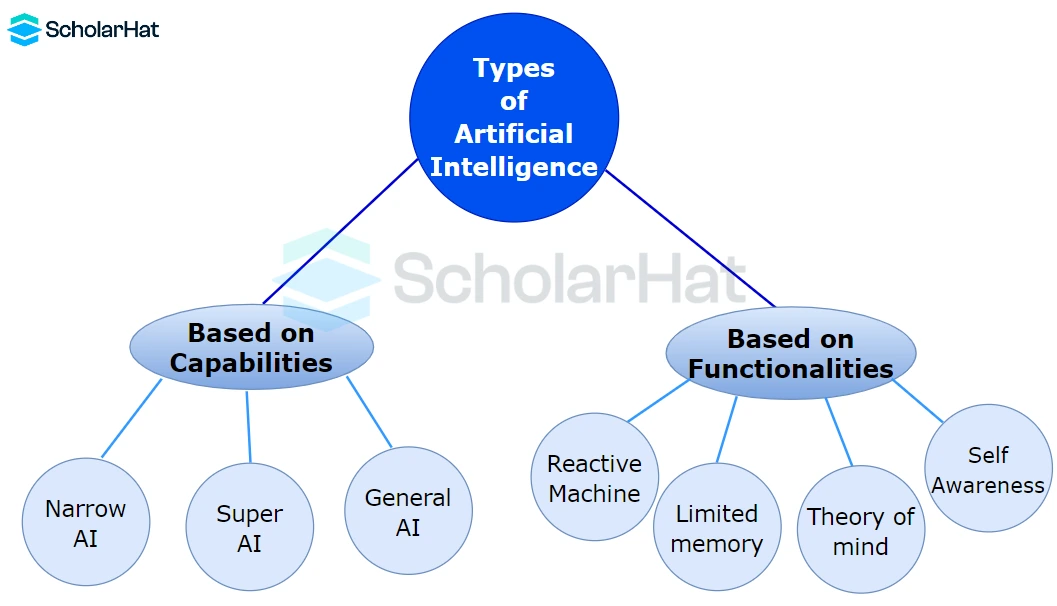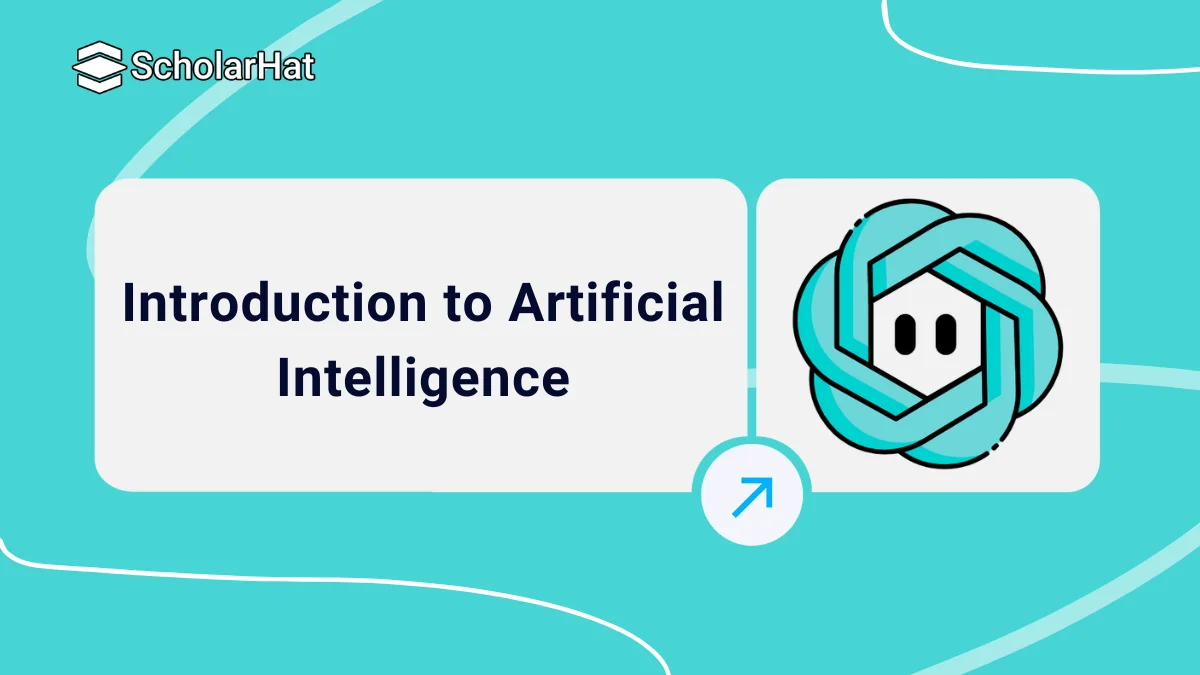06
FebIntroduction to Artificial Intelligence
Artificial Intelligence (AI) is a branch of computer science that focuses on creating machines and systems capable of performing tasks that typically require human intelligence. These tasks include learning, reasoning, problem-solving, understanding natural language, recognizing patterns, and making decisions.
In this AI tutorial, you will explore the history of Artificial Intelligence, its different types, the technologies behind it, how AI works, its importance, and its various uses and more on. If you’re ready to start your AI journey, the Free Azure AI-900 course is perfect for building a strong foundation.
What is AI and the History of AI
Definition
Artificial intelligence (AI) is the manner of human intellect in machines, giving them the ability to think and learn similarly to people. It entails creating computer programs that can analyze data, reason, find solutions to issues, and adjust to changing conditions.
History of AI
John McCarthy, a computer scientist, invented the phrase "Artificial Intelligence" in the 1950s while speaking at the Dartmouth Conference. This signaled the start of a field investigating the development of intelligent machines. AI has made significant strides over the years, which may be largely ascribed to improvements in processing power and the abundance of data. These advancements have allowed AI to morph into a technology that has applications across many industries and is improving our daily lives.
Types of AI

The numerous types of AI represent various methods and procedures used in the industry. Machine Learning, Deep Learning, Reinforcement Learning, and Natural Language Processing are active fields of study and development that individually contribute to the development of AI capabilities, even if Narrow AI is already common and General AI is still a long-term objective.
Narrow AI (Weak AI)
- Created for particular tasks or issues.
- Speech recognition & image categorization are two ai technology examples.
- In a particular field of expertise.
- Concentration on a specific task and lack of overall intelligence.
General AI (Strong AI, Human-Level AI)
- Demonstrates intelligence similar to that of humans across a wide range of tasks and disciplines.
- Utilizes knowledge in many circumstances after understanding it and learning it.
- Aims to reach a degree of intelligence comparable to that of humans.
- It is still only a theoretical idea that has not yet been realized.
Super AI
- Super AI is known as a level of Intelligence of Systems at which machines can surpass human intelligence, and can perform any task better than humans with cognitive properties. It is an outcome of general AI.
- Some key characteristics of strong AI include capabilities including the ability to think, reason, solve the puzzle, make judgments, plan, learn, and communicate on its own.
- Super AI is still a hypothetical concept of Artificial Intelligence. The development of such systems, in reality, is still a world-changing task.
Machine Learning (ML)
- AI subset is known as machine learning (ML) which enables computers to learn from data.
- To find patterns and make predictions, algorithms analyze data.
- Enhances performance without intentional programming.
- Used in a variety of applications, such as pattern recognition and data analysis.
Deep Learning
- Machine learning's branch known as "Deep Learning" was motivated by the human brain.
- Complex relationships and patterns in data are learned by neural networks.
- excels at tasks like speech synthesis, image recognition, and natural language processing.
- Requires a significant quantity of computing power and data.
Reinforcement Learning
- AI systems acquire the ability to make decisions and conduct actions in an environment through reinforcement learning.
- By trial and error, maximizes benefits, or reduces penalties.
- Agents interact with their surroundings, take feedback into account, and modify their behavior.
- Used in autonomous systems, video games, and robotics.
Natural Language Processing(NLP)
- Machine understanding, interpretation, and generation of human language are all made possible by natural language processing (NLP) in AI.
- Includes initiatives like sentiment analysis, language translation, and speech recognition.
- Improves communication and interactions between people and computers.
- Enables the processing and creation of human-like language by AI systems.
Technologies Based on AI
These technologies are still developing, allowing companies and organizations to optimize operations, obtain new knowledge, and develop creative solutions, ultimately resulting in innovations and improvements in a variety of industries.
- AI as the Foundation: Cutting-edge technologies that are altering industries all over the world are fundamentally based on AI.
- Machine Learning (ML): Machine Learning (ML) is a subset of AI that gives systems the ability to learn from their experiences and advance without explicit programming.
- Natural Language Processing (NLP): Improves human-computer interactions by enabling robots to understand & interpret human discourse.
- Computer vision: Allows machines to analyze and comprehend visual data, revolutionizing industries like picture recognition and video analysis.
- Applications across a Range of Industries: These AI technologies are used in a range of sectors, including healthcare, banking, transportation, entertainment, & more.
- Healthcare: AI helps with disease diagnosis, drug discovery, & personalized treatment recommendations through the study of medical images.
- Finance: AI-driven algorithms help the financial sector with fraud detection, risk assessment, algorithmic trading, & customer support.
- Transportation: AI-based traffic management systems and autonomous cars are revolutionizing the sector.
- Entertainment: AI drives content development, virtual assistants, immersive experiences, and recommendation systems.
How Does AI Work?
To find patterns and forecast results, AI systems process enormous amounts of data. In particular, machine learning relies on labeled data for training models for the system to learn and develop over time. A form of machine learning called deep learning is based on synthetic neural networks that resemble the structure and operation of the human brain. These networks can process large amounts of data and decide depending on patterns they find.
Importance of Artificial Intelligence
The following are a few of the primary reasons why AI is important:
- Encourages innovation and the creation of new technology.
- Increases efficiency by automating repetitive processes.
- Uses sophisticated algorithms and data analysis to solve difficult challenges.
- Gleans insights from vast amounts of data to enable well-informed decision-making.
- Provide a competitive edge through process customization and optimization.
- Enhances consumer experiences through customized interactions.
- Improves patient care while also advancing medication discovery, diagnostics, and healthcare.
- Use monitoring and anomaly detection to increase safety and security.
- Requires moral concerns for appropriate deployment.
Uses of Artificial Intelligence and Applications of AI
Following are some Uses of artificial intelligence & applications of AI:
- Artificial intelligence (AI) has applications across many industries, revolutionizing how we work and live.
- AI is being applied to healthcare to create personalized therapies, build diagnostic tools, and foresee disease outbreaks.
- Algorithms driven by AI are utilized in finance for algorithmic trading, risk analysis, and fraud detection.
- With self-driving cars & improved logistical processes, AI is also revolutionizing the transportation industry.
- AI is also improving user experiences in e-commerce with chatbots, virtual assistants, and personalized recommendations.
AI technology examples in Everyday Life
Here are some ai technology examples in daily life:
Virtual Assistants
- AI is used by virtual assistants like Siri, Alexa, and Google Assistant to recognize spoken instructions and carry them out.
- They offer assistance, carry out duties, and supply information.
- Social media algorithms:
- To curate personalized news feeds, social media networks use AI algorithms.
- AI examines user behavior and preferences to identify links and offer pertinent information.
Streaming Services
- To determine customer preferences, streaming platforms like Netflix and Spotify use AI.
- Based on user data and content metadata, AI algorithms propose movies, TV shows, music, and playlists.
Online shopping
- AI-enabled e-commerce systems provide tailored product recommendations.
- User preferences, browsing history, and purchasing trends are used to determine recommendations.
Fraud detection
- To identify and prevent fraud, financial institutions use AI algorithms.
- AI examines transaction trends, spots anomalies, and alerts users to potentially dangerous activity.
Devices for the Smart Home
- AI powers these devices, learning user routines & preferences.
- Based on user requirements, they regulate things like lighting, temperature, and security.
System of navigation
- Google Maps and other AI-based navigational tools offer routes that are optimized.
- For precise direction, AI examines real-time data, and traffic patterns, including historical data.
Email spam filters
- Email services use AI algorithms for effective spam filtering.
- Spam and other unwanted messages are automatically detected and forwarded to the proper location.
Voice and Image Recognition
- Voice and picture recognition are made possible by artificial intelligence (AI).
- Applications include biometric authentication, photo tagging, and smartphone unlocking.
Personalized Ads
- AI systems examine user preferences and behaviour for customized adverts.
- Based on user demographics as well as online activities, ads are customized.
Ethical Considerations in AI
As AI spreads, significant ethical issues are brought up that must be resolved. One major worry is the possibility of bias in AI systems, which might support discrimination and societal inequities. To establish accountability and reduce bias, AI systems must be transparent and comprehensible. In addition, there is a constant discussion regarding how AI will affect employment and the nature of work in the future. It is important to think about the ethical implications of AI and make sure that its creation and application are consistent with moral principles and the welfare of society.
Future of Artificial IntelligenceArtificial intelligence has a bright future and countless potential applications. It is anticipated that developments in AI will encourage innovation across industries and revolutionize our way of life and work. Although it is still a long way off, general AI could revolutionize civilization by giving computers human-like intellect and capacities. To make sure that AI is utilized properly and for the good of all, it is crucial to address the ethical, legal, & societal ramifications as it continues to develop.
Best Practices of AI
The following are some best practices for implementing AI in your company:
- Establish Specific Goals and Objectives: Establish precise goals for implementing AI while identifying possibilities and issue areas.
- Detailed Impact Assessment: Evaluate the potential effects of AI on business operations, human resources, and ethics.
- Encourage Collaboration: Promote cooperation between domain experts, stakeholders, and AI professionals.
- Ensure Data Quality: Create data governance practices and use accurate and pertinent data for AI training.
- Invest in AI capabilities: Through education and ongoing learning, the workforce may develop AI capabilities.
- Start Small: To learn iteratively and gain confidence, start with small, manageable AI projects.
- Uses of artificial intelligence with ethics: Take into account biases and their ethical ramifications, ensuring fairness and transparency.
- Plan for Change Management: Through efficient change management, get ready for process & role changes.
- Monitor Performance: Constantly assess how well AI is performing and make the required corrections.
- Stay Updated: To improve capabilities and stay ahead, keep up with the latest developments in AI.
Summary
Artificial intelligence (AI) is a powerful and revolutionary technology that can change the course of human history. Understanding AI's potential, constraints, and ethical issues is crucial as technology develops. As we embark on this journey, it is crucial to ensure that various types of AI are developed and used responsibly, with a focus on societal growth and human values.
To enhance your skills in AI, Scholarhat provides you with Azure AI Engineer course and Azure AI Foundary Certification for your career growth. Don't be late, and Enroll yourself now.
Take our Artificialintelligence skill challenge to evaluate yourself!

In less than 5 minutes, with our skill challenge, you can identify your knowledge gaps and strengths in a given skill.







